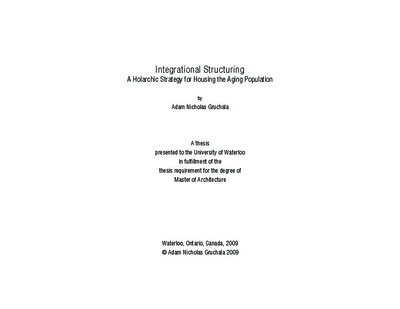| dc.description.abstract | Canadian society is facing a marked demographic shift as the baby boom generation ages. By 2031 almost 25 percent of Canadians will be over sixty-five; many of those will be north of eighty and the oldest boomers will be turning eighty-five. One person in four will be a senior.
The lack of acceptable intermediate solutions between independence and institutionalization has been pointed out as one of the significant problems facing elderly persons; traditional ‘institutional’ care which keeps older people apart and medicalizes old age, is no longer desirable. Likewise, the ‘golden ghettoes’ model may be appealing to those who can afford it but does not contribute to producing diverse, inclusive urban places. This thesis is an exploration of an alternative strategy. It investigates how architecture can provide a platform for social connection in a residential environment that allows in equal measure both independence without isolation, and informal community with safety and security. The design proposal establishes five architectural strategies which address the fundamental spatial implications of encouraging aging-in-place. This exploration is supplemented with a cohousing strategy, providing a formal organizational tactic that encourages groups of residents to mutually support each other, strengthening social inclusion and reducing the use of formal care and support only where absolutely necessary.
The methodology employed examines the mutually dependent and interactive scales of City, Neighbourhood, Building, and Dwelling in conceiving of housing for an aging population that becomes a catalyst of urban integration and community regeneration. | en |

